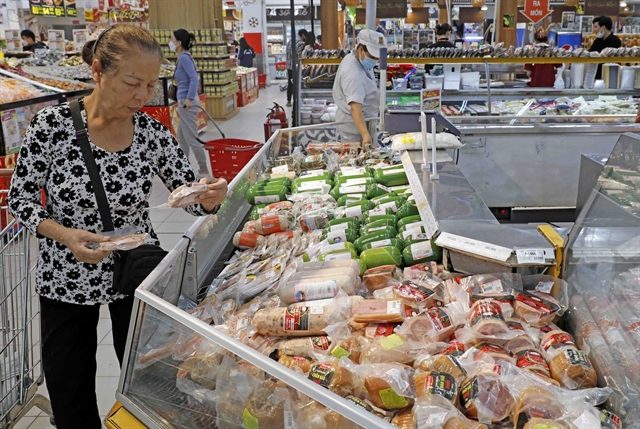In July alone, Vietnam's retail sales and services revenue was VNĐ528.3 trillion, a rise of 9.4 per cent from the same period last year, the General Statistics Office (GSO) said.

A supermarket in Hanoi. In the first seven months of 2024, retail sales reached some VNĐ2.8 quadrillion, up 7.4 per cent year-on-year. — VNA/VNS Photo
Vietnam's retail sales and services revenue in the first seven months of this year totalled about VNĐ3.6 quadrillion (US$143.2 billion), up 8.7 per cent year-on-year, the General Statistics Office (GSO) said.
In July alone, the value was VNĐ528.3 trillion, a rise of 9.4 per cent from the same period last year, with food sales up 12.1 per cent, household utensils 5.3 per cent, garments 6.9 per cent, lodging and catering services 13.9 per cent and tourism 6.8 per cent.
In the seven months, retail sales reached some VNĐ2.8 quadrillion, up 7.4 per cent year-on-year (up 4.3 per cent if the price factor is excluded).
Sales of food and foodstuffs rose by 10.7 per cent, household appliances 11.1 per cent, garments 9.1 per cent, vehicles (except cars) 3.4 per cent and cultural and educational products 11.2 per cent.
Revenue from accommodation and catering services was estimated at VNĐ419.2 trillion, up 11.6 per cent year-on-year.
Tourism revenue in the period was VNĐ35.2 trillion, representing an increase of 31.8 per cent from the corresponding time last year.
Meanwhile, revenue from other services stood at VNĐ370.2 trillion, a year-on-year rise of 9.4 per cent.
Localities posting increases in the retail sales of goods in the first seven months included Quảng Ninh Province, with 10.2 per cent, Đà Nẵng 7.8 per cent, Cần Thơ city 7.6 per cent, Hanoi 6.6 per cent and HCM City 6.3 per cent.
To stimulate consumption, localities have been stepping up trade promotion activities including the Hanoi Department of Industry and Trade which organised a July Promotion Day fair for five days at Times City Urban Area, in Hai Bà Trưng District.
In HCM City, from the beginning of August, the Department of Industry and Trade will organise mobile goods sales points to serve low-income workers in districts, industrial parks and export processing zones. This is a group of customers who have little chance to regularly access shopping in supermarkets that have major promotional programmes.
This year, those mobile sales points also have the participation of major brands and foreign-invested enterprises under proposal from the department.
Meanwhile, the Đà Nẵng Department of Industry and Trade has been running a programme which is still active until August 8, to stimulate shopping in the city. This activity aims at promoting support for enterprises in popularising their brands, products and services and also creating more chances for consumers to buy goods and services with quality and reasonable prices.
According to Nguyễn Phương Nga, Business Director of Kantar Vietnam, consumers are reducing shopping frequency, but they buy across more channels, with the average spending per shopping trip also increasing, reported the Công thương (Industry and Trade) newspaper.
The e-commerce channel currently contributes 8 per cent to the total value of the fast-moving consumer goods market and is expected to increase by two percentage points in the next two years. This opens up opportunities for brands, especially smaller ones, to reach more shoppers.
Therefore, manufacturers need to grasp the factors that influence spending according to shopping channels. With different purposes, buyers have different criteria when choosing shopping channels.
In addition, it is necessary to focus on product segmentation to meet the needs of buyers.
At the same time, it is necessary to take advantage of the multi-channel trend to reach more shoppers, because consumers tend to prefer modern and convenient retail channels. — VNS
Read original article here